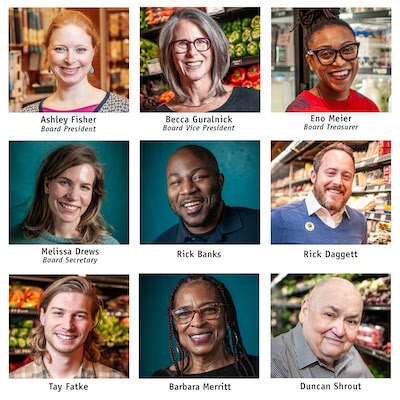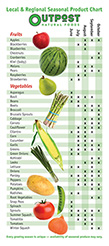
Hi, I'm Your Board
Outpost's Board of Directors will use this blog to discuss issues the board is exploring as it envisions Outpost's future. Can't make it to a meeting? Check here frequently to read what the Board is up to.
…
Read More...

If you attended the Annual Meeting of Outpost Owners on February 16th you would have heard guest speaker Venice Williams, Executive Director of Alice’s Garden speak about creating a community table for all come to and share a meal. Venice shared many stories of growing up and gathering in the kitchen to share a meal of good food. There was something she said that struck me from her stories and that was we have our “Eyes wide shut.” I understood this to mean we are all a part of a larger community in which we need to make sure everyone has access to good and affordable food. This got me thinking, what am I doing? What is Milwaukee doing? What other cities are facing food accessibility issues?
Read more...

I remember when I first was made aware that I could run for the Outpost Board in Winter 2012. It was advertised on one of the winter mailings and since the deadline to apply was in June, a whole five or six months away, I filed it away and promptly forgot about it. Every couple of weeks, I would be griped with the anxiety that I had missed the deadline, only to see that the deadline was still a couple of months away.
Read more...

Most monthly meetings of the Outpost Board of Directors include an opening session “Envisioning the Future,” in which a board member or guest speaker presents a topic that, ideally, both informs and inspires directors to think creatively about Outpost's future and role in the community. I think we all look forward to these sessions, because they really do expand our horizons, and they're (almost) as much fun as poring over financial reports.
Read more...

As board members, we have a fiduciary responsibility to every owner of Outpost Natural Foods. In other words, the nine of us have been elected with trust and confidence to help manage and protect the co-op’s interest. We do this through sound decision making and representation.
Read more...
Tags:
Wellness,
Shop/Eat Local,
Organic,
Milwaukee,
Environment,
Current Affairs
Permalink |
Comments |
Share This

As we move forward into a brand new year, it’s a great time to take stock of the good that cooperatives like Outpost do.
One of the big things on my list? Education.
Read more...
Tags:
Wellness,
Shop/Eat Local,
Organic,
Milwaukee,
Food and Drink,
Farming,
Environment,
Current Affairs,
Culture
Permalink |
Comments |
Share This

This past October, a group of about 30 owners and employees had the good fortune to participate in a national screening of Food for Change, a film produced, written and directed by Steve Alves.
Read more...
Tags:
Shop/Eat Local,
Organic,
Milwaukee,
Film,
Current Affairs
Permalink |
Comments |
Share This

As we enter the holiday season, what does the art of giving or giving thanks mean and are they different? The golden rule has always been that it is better to give than receive and that we should always give thanks for what we have.
Read more...
Tags:
Shop/Eat Local,
Milwaukee,
Food and Drink
Permalink |
Comments |
Share This

Authors Karen Zimbelman and Marilyn Scholl wrote an article for food cooperative board directors titled: The Ownership Toolbox. They tried to define members of cooperatives by level of involvement. At Outpost, we refer to our members as owners. We hope that all shoppers someday choose to expand their involvement and become owners. They can do this by purchasing a share of the cooperative. At the same time, we hope that all owners continue to expand their participation while enjoying their ownership. How would you define yourself as an owner? Do any of these definitions of participation come close?
Read more...
Tags:
Shop/Eat Local,
Organic,
Current Affairs
Permalink |
Comments |
Share This

As a political junkie and policy nerd, I love cooperative principle #2: democratic control. It’s so elegant in its simplicity and so ultimately truthful that it stands as the fundamental electoral principle of our country and the goal of developing democracies throughout the world: one member, one vote.
Read more...
Tags:
Current Affairs
Permalink |
Comments |
Share This

Saving the bees:
What does pollination have to do with the board of directors at Outpost Natural Foods? Well, our role is to envision our cooperative, the way it relates with and provides for its owners under a variety of circumstances.
Read more...
Tags:
Organic,
Gardening,
Farming,
Environment
Permalink |
Comments |
Share This

One of the really cool parts of my day job at Feeding America is that I get to travel around the country to join, start, simplify, complicate, explicate, and otherwise advance some of the big conversations surrounding food, food access, hunger, and food systems. It’s really one of the favorite parts of my job.
Read more...
Tags:
Shop/Eat Local,
Organic,
Milwaukee,
Gardening,
Food and Drink,
Farming,
Current Affairs,
Culture
Permalink |
Comments |
Share This

My daughter’s birthday is over and packaging from well intentioned gifts has left the house. Well, all accept one box. My daughter received a typically toddler toy with noises and flashing colors, nothing special really. However, it truly was a special gift! This toy came inside packaging that was designed to be used again. The thick box has an attractive plaid pattern on the outside and looks like something purchased at a fancy crafts store.
Read more...
Tags:
Milwaukee,
Environment,
Current Affairs
Permalink |
Comments |
Share This

“They should be teaching this in high school,” commented one owner at a recent class I took by Outpost nutritionist Judy Mayer on gluten-free options held at the State Street store. Her question got me thinking, should nutritional eating be a part of the curriculum right alongside math and science? Should it just be at the high school level, or sooner than that, grade school perhaps or even earlier?
Read more...
Tags:
Current Affairs,
Environment,
Farming,
Food and Drink,
Organic,
Science,
Wellness
Permalink |
Comments |
Share This

I have been an Outpost Board Member since November of 2012 and would like to share some insights since walking into that board room six months ago.
But first let me step back a little. Last year when I was mulling over sending in nomination papers it occurred to me that perhaps being a board member was something I may not be qualified for. Looking back I was right to feel hesitant but wrong in my qualification assumption. It all comes down to a few things I have either learned or verified over the past half year.
Read more...
Tags:
Culture,
Current Affairs,
Milwaukee,
Organic,
Shop/Eat Local,
Wellness
Permalink |
Comments |
Share This

I am in the middle of a modest household project. Inevitably, when head off to the hardware store to get some parts, I find myself in a conundrum of sorts.
Do I patronize the locally owned hardware store?
Or do I head off to the big box store?
Read more...
Tags:
Shop/Eat Local,
Milwaukee,
Current Affairs
Permalink |
Comments |
Share This

Dear Outpost Owners,
After having a few days to digest our annual meeting, we wanted to take a moment to recognize your level of commitment to our cooperative. Some of us shop, use re-usable bags and cups, donate time or money to Outpost organized community events, submit comments, fill out our surveys, read our website, follow and respond to our blogs, and attend owner events. We vote. And we celebrate our cooperative’s ongoing commitment to help our community. We even recruit friends and family to attend the annual meeting to support our values.
Read more...
Tags:
Shop/Eat Local,
Environment,
Current Affairs
Permalink |
Comments |
Share This

An e-mail recently appeared in my inbox that really got me thinking about the sustainability of current conventional farming practices. The e-mail contained a link to a report by the Center for Food Safety as part of its Save Our Seeds (SOS) initiative (http://www.centerforfoodsafety.org/campaign/save-our-seeds/). The report, Seed Giants vs. U.S. Farmers, highlights the ongoing practice of seed companies suing farmers for patent infringement when their fields are discovered to contain genetically engineered (GE or trangenic) crops, even though the farmers hadn't purchased GE seeds from the companies. The seed companies allege that farmers are knowingly saving seeds from prior year GE crops, or are obtaining GE seeds from “seed cleaners,” who specialize in the practice of processing seeds from prior years to use for subsequent plantings. According to the seed companies, these practices are expressly prohibited by the technology agreements signed by farmers who use GE seeds.
Read more...
Tags:
Wellness,
Science,
Organic,
Gardening,
Food and Drink,
Farming,
Environment,
Current Affairs
Permalink |
Comments |
Share This

Outpost board members engage in a vast number of activities related to the mission and values of Outpost Natural Foods. One great example happens to be the work of board director Suzanne Garr, whose involvement with the children of St. Mary Kevin, a school and orphanage in Uganda, Africa.
Read more...
Tags:
Art,
Culture,
Current Affairs,
Television,
Travel
Permalink |
Comments |
Share This

Last June, I had the good fortune to attend the Consumer Cooperative Management Association (CCMA) annual meeting in Philadelphia. It may sound like a big yawn, but it isn’t. One of the more interesting events was the screening of the completed part of a film by Steve Alves entitled Food for Change: The Twin Cities Story. Steve is a member of the Franklin Community Co-op in Greenfield, MA, and decided to research and produce this film which highlights a colorful history of the cooperative movement in the US.
Read more...
Tags:
Culture,
Current Affairs,
Film,
Milwaukee,
Organic,
Shop/Eat Local
Permalink |
Comments |
Share This

A recent study released by the National Cooperative Grocer’s Association (NCGA) should make you feel pretty good about shopping at Outpost.
Why?
Well, because the report underscores the many ways that coops surpass the competition when it comes to creating economic and social impact on their communities.
Read more...
Tags:
Shop/Eat Local,
Milwaukee,
Current Affairs
Permalink |
Comments |
Share This











